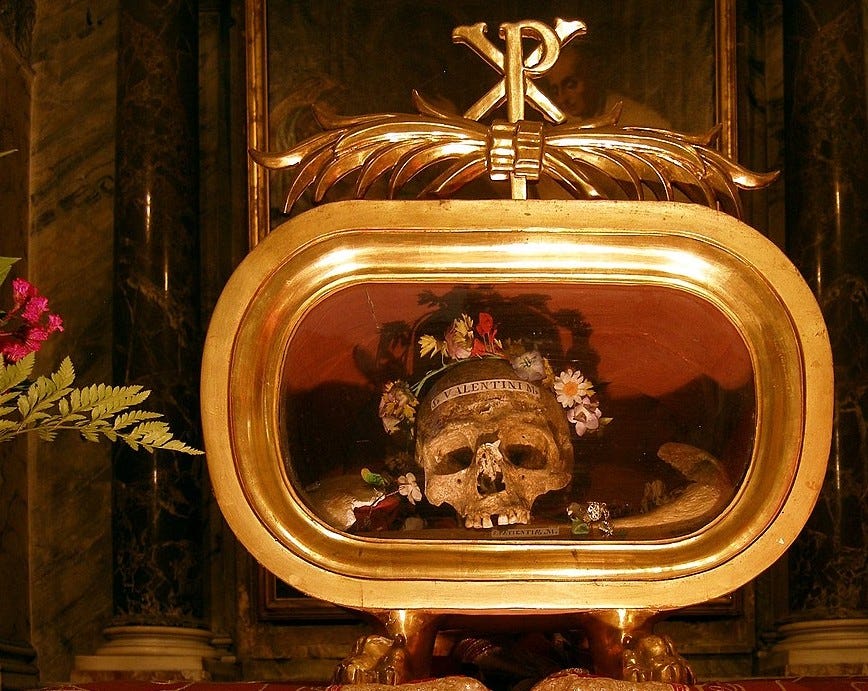By Lucetta Pabble
LONDON • February 14, 1385 — Geoffrey Chaucer was on his way home from a meeting with the Greenwich Greyfriars when he decided to duck into The Orb & Hound, the monks’ inn outside the monastery. The Greyfriars had given him a tour of their new abbey, blessed by Pope Boniface IX and situated along the southern bank of the Thames, just southeast of the city proper.
The monks were hoping their prized relic—the skull of St. Valentine—would begin drawing tourists interested in seeing the bones of the bishop who had been beheaded more than 1,000 years earlier. The Greyfriars had purchased the skull during a dispute between wealthy relics collectors.
When Ethelred the Unkempt, widower of Queen Swanhilde the Fussy, attempted to squirrel away St. Valentine’s skull after his wife’s death, the queen’s brother, Canute the Soiled, son of Baron Biggercanute, made a claim on the bones. The monks swooped in with a financial offer that made the peace and gave them a potential money-making relic. But they needed some marketing help and hoped a famous writer could give them a hand. (Not an actual hand.)
Chaucer no longer did much freelance work, but the monks were persuasive. They offered a year’s worth of free wine for a poem. (Fine print: As long as the poem resulted in a 25% year-over-year increase in saint’s relics tourism income across all Franciscan abbeys in England.) Chaucer didn’t do numbers or fine prints—he was a words guy, a big ideas guy—so he agreed to free wine and blah blah the stuff they said about percents and whatever.
Love & Murder
1 ounce of Campari
1 ounce of Green Chartreuse
1 ounce of lime juice
¾ ounce of simple syrup
5 drops of saline solution (4:1 salt to water)
Shake all ingredients with ice • Pour into a chilled Nick & Nora glass
“Good afternoon, free wine for me!” Chaucer said excitedly as he approached the Orb & Hound’s bar. He already had an idea for the monks’ St. Valentine poem. He was in a celebratory mood.
“Well, you have to write the poem first, and then it has to perform in the marketplace,” said the Orb’s bartender, Beatrix.
“How did you know about the deal? The meeting just ended.”
“The Greyfriars run a tight cog,” Beatrix said. “They’re only allowed to communicate with me through that hole.” She pointed to the wall of the pub. “The abbot says I’m ‘of loose character.’ Not just me—all women. One monk was flogged after he mistakenly touched my skin while handing my paycheck through the hole. But they’re efficient, and they make their wishes known. They’ve already relayed the message: No free wine for Mr. Pretty Poems until he makes his fingies do the scribble, scribble.”
“I see,” Chaucer said, laying a half-penny down on the bar.” A claret, please. Would you like to hear my idea for the poem? It’s called “The Complaint of Mars,” and it’s about Roman gods.”
“Blech,” said Beatrix, sliding a glass of claret across the bar. “I mean, ‘I sure do!”
Editor’s Note:
It’s pretty common knowledge that when a horse and donkey mate, the offspring (mule) can’t reproduce. So what was Noah—whose sole responsibility was to keep all the species going for the after-flood times—thinking when he allowed that kind of inter-species lovemaking on the Ark?
I don’t believe that question is actually answered in Episode 4 of “Ark,” the podcast in which Noah and his wife Naamah interview animals, but you should listen anyway. This week, you guessed it, the couple is a horse and a donkey.
Enjoy,
J. Finch Barlow
“Ok, so this bishop from Terni, in Italy, healed blind people and did all sorts of helpful things for Christians in the third century…”
“What is ‘century’?” Beatrix asked.
“So, um, a long time ago,” Chaucer continued, “this Bishop Valentine converted entire households of nobles to Christianity. The emperor at the time, Claudius Gothicus had Valentine found, beaten with clubs, and beheaded on Rome’s Flaminian Way.”
“Gross,” said Beatrix. “Why is the road important?”
“What? Details are important in writing,” Chaucer said.
“Right,” said Beatrix. “But in that case, I have no reference for what Flaming Avenue, or whatever you called it, is. So, why not just say ‘beaten with clubs, and beheaded’ period. Like, I didn’t need to know the name of the fire street to understand the point, which is that your guy was murdered in a horrible way.”
“Ok, I understand your point, but details are important in writing,” said Chaucer. “So, in the same way you have certain skills in bartending, for example…”
Beatrix rolled her eyes hard. “Yes, please explain to me the bartending.”
“Anyway, I’m going to use the theme of death to create love poetry,” Chaucer said triumphantly. “What, you may be asking yourself, does that have to do with Roman gods?”
“I was not asking myself that,” Beatrix said. “I was asking myself about whether I was going to eat turnip stew for dinner or a different turnip stew for dinner.”
Chaucer ignored her. “‘Valentine’ means worthy, strong, and powerful,” he said. “All the things love should be. And the name ‘Valentine’ is beautiful, just like love.”
“Want some boiled badger spleen twists?” Beatrix asked. “They’re good. Salty.”

“The poem will open at dawn on St Valentine’s Day, when birds find their mates for the spring and flowers open their petals to the morning sun,” Chaucer continued. “Then the narrator will tell the story of Mars, god of war, and Venus, the goddess of beauty. The two have planned an affair, but first, Venus tells Mars that he must be obedient to her, always.”
“I’m listening,” said Beatrix.
“In return, Venus pledges her eternal love to Mars. As darkness descends, they steal away together for the night. But in the morning, the sun—in the guise of Apollo—surprises them. Mars sends Venus to hide in a cave while he prepares to fight Apollo. The poem will then follow Mars as he wanders, burned by the sun, pining for Venus. He wonders why love even exists when lovers can so easily be forced apart.”
As Chaucer continued, Beatrix began pouring liquids into a metal container and shaking them around with some ice she’d chipped off the roof that morning. When he finished, Beatrix poured them each a glass of her concoction. “So this poem is about secret lovers,” she said, “despairing the arrival of the sun because it means the end of their time together. And possibly the hopeful thought that when the sun again disappears—which it does every day—other nights together will follow.”

“More or less,” Chaucer said. “I’m thinking of calling it ‘The Complaint of Mars.’”
“So he was the god of war but really just a typical whiny man,” Beatrix said. She pushed one of the drinks towards Chaucer. “I like the beheading stuff better.”
“I am moved by beauty, and I believe beauty will move people to come to this abbey to see an old skull,” Chaucer said, raising his glass toward Beatrix’s. “To love.”
Beatrix raised her drink to meet Chaucer’s. “To murder,” she said. And they drank.
Another Editor’s Note: Fact-based cocktail historians claim Love & Murder was created at Porchlight in New York City by Nick Bennett in 2021
SOURCES:
Claudius Gothicus, An Emperor’s Guide to Beheading, Mauling, and Rampaging (Rome: Circus Maximus Company, 265) pp. 245-249
Beatrix Streussels, Tenderbar: Medieval (London: Gilley & Sons, 1399) pp. 97-104
Kyle Trifflehedge, Baron Diggory Biggercanute III: A Biography (London: Swaff Press, 1888)
Contributors Notes:
Lucetta Pabble lives in town. All images from “Get Your Spit Out Of The Apple Sauce” are courtesy of Uriah Yaruah Gallery.
Actual For Real Credits:
Jack B. Oruch, “St. Valentine, Chaucer, and Spring in February,” Speculum (Vol. 56, No. 3, July 1981) pp. 534-565
Selected Poems of Geoffrey Chaucer, Study Guide








Love these.